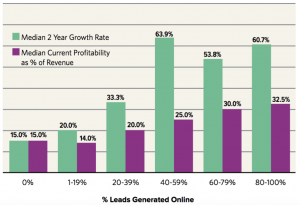The Top Six Strategies for Generating Leads on Your Website
Upgrade Your Website to Develop a Measurable Market Advantage
What strategies should professional service firms adopt to market their expertise? What impact do online leads have on the bottom line? Where should a firm place premium content? What can a firm do to minimize overt marketing? In this article, Dr. Lee Frederiksen of Hinge Marketing shares six strategies to improve your website, drive traffic, and successfully convert leads.
 Generating leads has long been a top priority for marketers at professional services firms…and it is becoming even more important every year.  Why?  Because more and more companies are going online to find and vet potential service firms.
Generating leads has long been a top priority for marketers at professional services firms…and it is becoming even more important every year.  Why?  Because more and more companies are going online to find and vet potential service firms.
[su_pullquote align=”right”]Resources:
Building a New Business Pipeline
Implementing Your Referral Marketing Plan
Marketing Techniques to Gain Referrals
Make-Over or Do-Over? Your Practice Building Workshop
[/su_pullquote]
Savvy firms are taking a hard look at their websites to better cater to this online clientele.  The most successful professional services websites not only communicate a firm’s capabilities, but they attract and nurture high-quality leads and prospective clients, too.  Firms that upgrade their websites in this way have a measurable market advantage.  In fact, according to our research, firms that generate at least 60% of their leads online grow four times faster and are twice as profitable as competitors that do not emphasize online lead generation.
How Online Lead Generation Can Predict Growth and Profitability
1.         Optimize your website to generate leads
It is hard to overemphasize the importance of your website.  It is usually the first place people go for more information after they hear of your firm.  That is why it is essential that your website convey who you are, how you can help (your services), and how you are different from similar firms.
The modern website should also be findable through online search.  That means building it in a way that Google and other search engines can efficiently find the site, crawl through its pages, and index what they find.  But to attain the first-page Google rankings that will draw a steady stream of qualified traffic, you will need to incorporate appropriate keywords (words or phrases people type into a search engine) in your site content, as well as optimize your pages in a variety of other ways.
The next step is to ‚Äúmeet them where they are‚ÄĚ in the buying cycle.¬† Do this by providing valuable, relevant content that engages visitors and moves them further along the sales funnel.¬† In our experience, there is a direct correlation between website traffic and the number of conversions and leads a website generates.
2.         Make it easy for visitors to use your site
To generate online leads, you have to shape the experience users have on your site.  This starts with clear, compelling text (known as copy, in marketing-speak) on your homepage.  A well-optimized homepage should include at least 200 words of copy that clearly explains what you do and what differentiates you from competitors.  Be sure to incorporate one or more search engine keywords into this copy.
Another key to good user experience is ease of navigation.¬† Top-level navigation links on your website should be labeled in simply written, easy-to-understand language.¬† There are plenty of places on your site where you can be creative‚ÄĒbut your navigation area is not one of them.¬† If you try to be too clever in your navigation, you run the risk of confusing visitors and preventing them from finding the information that is most important to them.¬† If you have multiple target audiences, think about creating distinct pathways on your homepage that direct each audience to the relevant parts of your site.
3.         Use simple forms to grow your prospect list
One of the best practices in online lead generation is to place premium content‚ÄĒcontent on your site that visitors will find especially valuable‚ÄĒbehind a registration form.¬† Unlike blog posts and other open-access material, premium content usually explores a topic in significant depth.
A typical registration form asks for a small amount of basic information, such as first name, last name, and e-mail address.¬† Multiple research studies have demonstrated that the fewer fields in your forms, the more likely people are to complete them.¬† Registration forms come with an added benefit: individuals who are willing to exchange personal information for a piece of premium content already have a strong interest in your expertise‚ÄĒmaking them excellent leads.¬† You should engineer your site to automatically add their names and contact information to your prospect list for subsequent marketing and outreach.
4.         Create a blog and library featuring timely, relevant content
Blogging on a regular basis is an important way to demonstrate your expertise by serving up informative, educational content to your target audiences.¬† Make it easy for readers to subscribe to your blog and share your posts on social media.¬† And for even better online lead generation, invite guest bloggers to write for your blog.¬† In the spirit of reciprocity, ask if you (or another subject matter expert at your firm) can guest blog on their sites.¬† If so, ask that at least one link in your guest post point at your website.¬† This practice will not only expand your reach, it can improve the ‚Äúauthority‚ÄĚ of your website‚ÄĒmaking it easier to rank highly in search results for competitive keywords.
There is more to content marketing than blogging, however.¬† You should consider including a resource library on your website‚ÄĒa place where visitors can view and download premium content.¬† Your resource library should not include overt marketing messages or your firm‚Äôs marketing collateral.¬† Rather, it should feel like a neutral place where people can find unbiased, practical educational information.¬† Examples of the kinds of materials you might find here include: white papers, executive guides, instructional videos, and e-books‚ÄĒall focused on topics of interest to your audience.
5.         Give visitors more ways to engage with you
From the moment people land on your website, they should find a wealth of targeted offers to engage more deeply with you.  In addition to opportunities to download premium content, these could be offers to register for a webinar/speaking engagement, sign up for a free consultation, or receive a particular service on a trial basis.  You will want to include offers that address every stage of the sales funnel so that everyone from tire kickers to serious buyers have a next step to take.  And when prospects respond to these appeals, your business development team can determine by its type how likely each lead is to turn into a sales opportunity.  For instance, prospects who have begun to engage more directly with your organization by participating in webinars or requesting personal consultations are closer to converting than visitors who have simply subscribed to your blog.  The more direct and personal the visitor’s interaction, the closer you are to closing a deal.
6.         Never stop improving your site’s lead generating capabilities
Use a customer relationship management (CRM) program, website analytics package, or marketing automation tool to track visitors’ activities on your site.  Which pages do they visit most frequently?  Which offers have they responded to?  And what content have they downloaded?
You can make these tools even more powerful by conducting regular tests of your content and offers.¬† Even small changes‚ÄĒtweaks to headlines or graphics, for instance‚ÄĒcan dramatically improve your conversion rates.
To get the most out of your online lead generation program, you need to regularly monitor how visitors are interacting with your site and its content‚ÄĒthen make periodic adjustments.¬† Our research has shown that the most successful professional services firms rely on these strategies to increase growth and profitability.¬† So should you.
That is why Hinge is pleased to partner with NACVA on an exclusive offer to members: a tailored, research-driven, high-performance website.¬† Our offer includes all of the elements above‚ÄĒand then some.¬† To learn more about our lead-generating, high-performance website offer, just click here.
We have also created a free user-friendly resource for firms that are interested in created their own high-performance websites.  I invite you to download our Lead Generating Website Guide.
Lee W. Frederiksen, PhD, is Managing Partner at Hinge, the leading branding and marketing firm for the professional services. Hinge conducts groundbreaking research into high-growth firms and offers a complete suite of services for firms that want to become more visible and grow.
Mr. Frederiksen can be contacted at (703) 391-8870 or by e-mail to LFrederiksen@hingemarketing.com.










